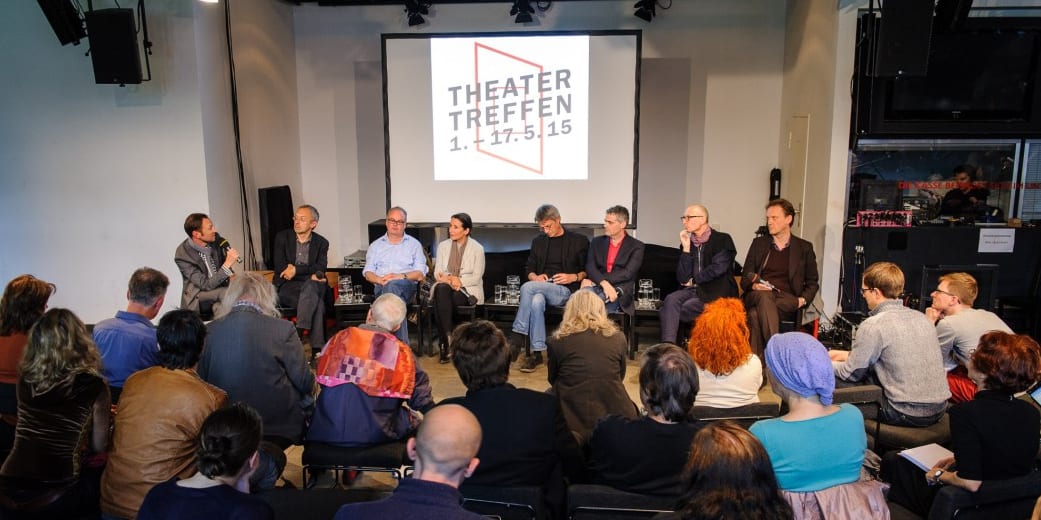What is Theatertreffen?
As Rivka Jacobson put it “every year, a seven-member jury zips across Germany, Austria and Switzerland, taking in scads of theatre to determine the 10 “most remarkable” German-language productions”.
The Federal Foreign Office invited delegates from 20 countries to attend the 52nd Theatertreffen. Rivka Jacobson, of playstosee.com, representing England, was among the guests.
Here are some of Rivka’s impressions:
A state-funded theatre festival is always a treat; And Berlin’s Theatertreffen is a feast, the place to be if you are keen on the performing arts.
An invitation from the German Federal Foreign Office to travel to Berlin for the Theatertreffen festival led to exposure to remarkable productions and priceless encounters.
Theatertreffen Festival was launched in 1963, only two years after the implementation of the Berlin Wall. Whilst its roots are lodged firmly in Berlin’s political backdrop, the festival functions as a mark of progress and evolution- both social and cultural. The funding from government subsidies offers directors immense creative freedom, a catalyst for avant-garde theatre that consistently challenges its audience and critics.
I was one of twenty guests as part of the Foreign Office’s ‘Visitor Program’, intended to showcase the festival to a global audience. Theatertreffen Festival presented the ten ‘most remarkable’ productions in German-speaking theatre from 2014, including productions from Germany, Austria and Switzerland.
A panel of seven jurors selected the ten plays, by scouring the three German-speaking countries’ theatres selecting a long list of remarkable productions that was eventually whittled down to the ten performed at the festival. After each premier performance, a Theatertreffen prize is awarded to the director.
The festival certainly evokes a sense of freshness and creates an interesting juxtaposition between the old and the new. Five of the ten directors are appearing at Theatertreffen for the first time. Seven of the ten are below forty years old. Three of the plays are led by female directors. Furthermore, four of the ten plays are composed by contemporary playwrights. Susanne Kennedy’s adaptation of Rainer Werner Fassbinder’s 1970 film Why does Herr R. Run Amok? is a prime example of the experimental mindset of the group of directors of the show.
Theatertreffen also includes productions, which take a fresh look on classic dramas. Bulgarian director Ivan Panteleev’s production of Beckett’s Waiting for Godot is powerfully evocative. It is innovative, gripping and absurdly believable. Less successful is Karin Henkel’s production of Ibsen’s John Gabriel Borkman. The set design is imaginative and offers promise, yet the direction gradually grows exasperating. The opening scene inserted by the director, where Ella and Mrs Borkman, her sister, are presented as young girls fighting over a teddy bear until they pull its head off, may sum-up this production’s director.
Social-political themes dominated some of the plays, in particular, the subject of refugees in Germany. They had a loud and clear voice at this festival. In addition to a letter from the refugee group “Lampedusa in Hamburg” that was read at the end of every premier production, a number of plays, such as Yael Ronen’s Common Grounds and Nicolas Stemann’s production of Elfriede Jelinek’s The Supplicants highlighted their plight and society’s obligations towards the refugees.
Of the two Austrian plays selected for the Theatertreffen prize, Wolfran Lotz’s play The unmarried (die unverheiratete) raises moral and social-political issues that go back to World War II. Themes from the Greek tragedy Electra cloak the Austrians’ reflection about loyalty and betrayal during the war. The loyalty is to the Nazi regime, and the betrayal is that of a soldier who decides to defect two weeks before the Nazi armies had been defeated.
Some productions proved troubling in terms of direction and at times, subtitling lacked coherence. Nevertheless, each of the ten productions celebrated the potential of theatre to challenge and to move.
The plays generally provoke questions rather than giving answers, leaving the audience with a great deal of thinking to do on their journeys home. Equally refreshing are the attitudes of the directors and actors who are open, warm and more than happy to answer questions and explore the themes of the productions with critics and the audience alike.
Theatertreffen festival is a leading light in the European theatre. It is a celebration of the avant-garde theatre, exploring its limitless possibilities and questioning the relationship between drama and audience- one thinks the likes of Beckett and Fassbinder would surely approve.


